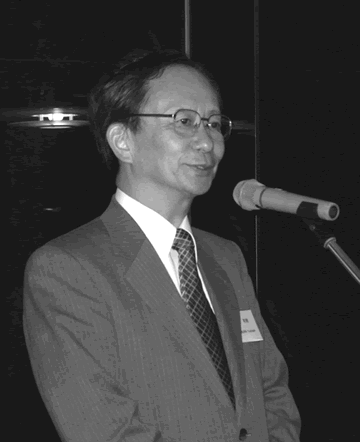| Annual Newsletter of the Slavic Research Center,
Hokkaido University |
||
| No.13
, February 2006 |
back to INDEX>> | |
Essays by Foreign Fellows
| Mikhail Dolbilov |
Elza-Bair Guchinova |
Matthew Lenoe |
 |
|
Prof.NISHIMURA Yoshiaki
Vice President of Hitotsubashi Iniversity; Member of SRC Board of Directors; ield of Specialization: Comparative Economic Systems, Russian and East-European Economy |
First of all, I would like to congratulate the Slavic Research Center on its 50th anniversary, and I am honored to be here to celebrate such a momentous occasion. As you heard previously, I have been involved in administration for many years and have therefore been unable to pursue research opportunities. Because of this, I do not feel comfortable addressing academic concerns. Instead, I would like to deliver my congratulations in terms of management.
I have been working in a university environment for 30 years. During this period, I have come to realize how important the time span of one year can be for any university or department. For example, on the last business day of the year, I think back over the last 12 months and many things spring to mind, while at the same time, I feel a sense of relief that both the Research Institute, where I work, and the university, have had a successful year. When I think back over the last 12 months, I am grateful for all the efforts made by the staff. I think all universities and departments experience the same situation, in that every single year yields much efforts and results. I am amazed at the Slavic Research Center’s 50-year history that is filled with such efforts and results. It is easy to say “50 years,” but it is not so easy to mark a 50-year history. I would like to pay my respects to every member of staff that has helped to make this 50th anniversary possible.
Professor Hara mentioned “two milestones” earlier. This refers to two reorganizations, one is the reorganization of the university-wide research institute and the other is the reorganization of the nationwide research institute. Both reorganizations are very important for the development of this Center, and I presume that in proceeding with these reorganizations, the director and staff made significant efforts. However, from the viewpoint of the post-incorporated status of national universities, the reorganization of the nationwide research institute was a major and innovative accomplishment. I say “innovative” because there is the possibility that the Ministry of Education, Culture, Sports, Science, and Technology will only support nationwide research institutes after they have been incorporated. Although the Slavic Research Center still has “center” status, it does retain a strong position as a nationwide research institute. Our research institute, which is not a nationwide research institute, does not have such advantages.
The Slavic Research Center has another advantage. It is that the Center is located on the campus of Hokkaido University. In other words, it has a geographical advantage. I heard Hokkaido University is famous for activities that contribute to local society, and this Center is definitely contributing to Hokkaido University’s activities. Since Hokkaido is geographically very close to Russia, it is very important for Hokkaido to have an accurate understanding of Russian society. This Center has the advantage of contributing to local society through its activities as a research institute researching Slavic and Eurasian nations including Russia. The unique possibility to contribute to local society is thus opened, and it will provide a foundation for the future development of the Slavic Research Center.
To summarize,
therefore, the Slavic Research Center is a core site of a national and
international research center through its status as a national site for
Slavic and Eurasian researches, and also has the role of contributing
to local society. The Center assumes these dual roles and I have
no doubt that it will continue to grow dynamically using these roles as
wheels over the next 50 years.